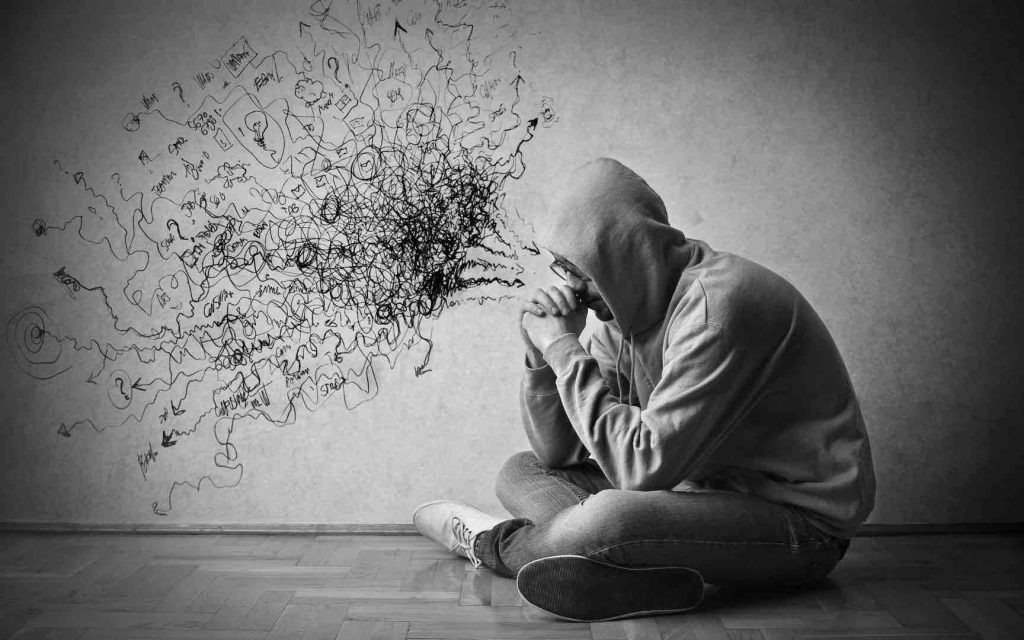Do you ever catch yourself thinking negative, catastrophising, or self-sabotaging thoughts? It seems counterintuitive. Well, you’re not alone. According to the National Science Foundation, the average person has between 12,000 and 60,00 thoughts per day, 85% of these are negative.
That’s a staggering figure.
Why is this happening?
There could be several reasons why your thoughts are against you. Stress, anxiety, and depression affect how you think. Having low self-esteem and unrealistic expectations strengthens your harsh inner critic. And your core beliefs feed your negative thoughts.
As you can see it’s not a simple answer.
In this post, I’ll explore each in more detail to give you a further understanding of yourself. I’ll also provide you with some tips on what you can do to combat those self-sabotaging thoughts.
I invite you to learn more and take positive action to take back the reins of your own mind.
1 Negative Thinking Patterns Can Affect Your Mindset

What good and bad habits do you have? Humans can’t help themselves; they are habitual by nature. That’s why so many people struggle with smoking, drinking, phone addiction, procrastination, and negative thinking.
Our brains are neuroplastic. Which means they can be restructured and changed. So, the more you think negatively, the more this becomes habitual.
You build and then strengthen those neural pathways. In a sense, you rewire your brain. Then these negative thinking patterns become normal and hard to break out of. These are called thought distortions or thinking errors.
Let’s look at a few examples:
- “Tomorrow is going to be a disaster” (catastrophising).
- “I messed up again, I’m never going to get anywhere in life” (overgeneralisation).
- “They must think I’m a complete failure” (mind reading).
- “I’m nobody special, anybody could have done that” (minimising).
- “Unless I do it perfectly, there’s no point in trying (all-or-nothing).
Do any of those examples feel familiar?
When you fall into these negative thought patterns, it feels like your own mind is working against you. Well, it is, but don’t worry. You can change the way you think and learn to not take your thoughts as facts.
More on that later.
“For many, negative thinking is a habit which, over time, becomes an addiction.”
― Peter McWilliams
2 Stress and Anxiety Heighten Your Threat Response
Stress and anxiety are common in today’s fast-paced society. They’re no fun either. I’ve suffered from both. How about you?
Suffering from either can cause fatigue, insomnia, and put you into fight-flight-or-freeze mode. This means you’ll be on high alert, looking for danger and threats. Can you guess how that will affect your thoughts?
It means you’re more likely to think about what can go wrong. You’ll be analysing people, situations, and events, expecting there to be problems.
This is what used to happen to me, so I know how overwhelming it can feel. I’d anticipate and predict negative outcomes, with no evidence at all. The thoughts felt real and factual, but they weren’t.
Sadly, many of us fall into this trap. Especially as our modern way of living pressures us to strive, gain, and succeed. It feels like we aren’t allowed to take our foot off the gas pedal for a second.
Feeling this way at the moment? Read my post giving you 10 Ways to Relax Guilt Free. I’m sure you’ll find at least one suggestion in there that you’ll want to try.
3 Low Self-Esteem Gives Power to Your Inner Critic

When you have low self-esteem, you have little self-compassion. This means you won’t be kind, patient, and understanding towards yourself. As you can imagine, this affects how you think.
It gives power to your inner critic.
You know that little voice in your head. Telling you that you’re not good enough. We all have it. I like to call it the poisoned parrot. It sits on your shoulder, constantly berating your value and self-worth.
This can shatter your confidence, cause depression, and leave you feeling worthless
These thought loops make you think that your mind is out to get you. But this isn’t true. It’s just that you’ve developed thinking errors, that have now become habitual.
And where do these thoughts come from? I’ll get to that shortly.
If you need help cultivating self-compassion, then I encourage you to read my post How to Be Compassionate to Yourself. There I give you some powerful exercises to develop self-compassion. The same ones I used when I started my transformative journey.
Yup, that’s right. I also struggled a lot with compassion for myself. You can read more about my story in that post.
“Your inner critic is simply a part of you that needs more self-love.”
― Amy Leigh Mercree
4 Unrealistic Expectations Leave You Feeling Incapable
How realistic are your goals and expectations? This is an important question because if they’re unattainable and unrealistic, you’ll be left feeling incapable. This is common for perfectionists.
They set unrealistic standards which are impossible to meet. Then when they fail to reach them, that little voice pops up. It berates and criticises them, whispering “You’re not good enough”. What do you think happens next?
A loss of confidence arises. Then the fear to start again creeps in. So, they procrastinate to avoid the negative feelings that come with “failure”. Even if they build the courage to try again, if their standards and expectations are still unrealistic, they’ll fail once more.
This is a vicious cycle to be stuck in. One that fuels unhelpful and negative thoughts. Does this sound like you? If so, you could be a perfectionist.
Need some help managing your perfectionism? I wrote an informative post to help you that features a colourful diagram of the cycle I was talking about. Feel free to give it a read.
5 Your Beliefs About Yourself Are Holding You Back

We all hold core beliefs about ourselves. These have a huge impact on how we think and interact, with both ourselves and the world around us. Let’s look at a few common examples:
- “The world is dangerous.”
- “There is something wrong with me.”
- “I’m not good enough.”
- “I’m unlovable.”
- “Everything is my fault”.
Can you see how any one of these core beliefs could affect you?
They can spiral out of control, influencing how you think and behave. This can lead to everything I’ve spoken about so far. Negative thinking, stress, anxiety, low self-esteem, depression, and a relentless inner critic.
In other words, core beliefs are often the cause of negative and destructive habitual thinking. They influence your mind, making it feel like it’s your worst enemy. But this isn’t the case. Your mind has just become accustomed to a certain way of thinking.
Wondering where these core beliefs come from?
Let’s take a look.
“Be mindful of your core belifes, they could be holding you back”.
― Christopher Briggs
Where Do Your Core Beliefs Come From?
There’s no one fit answer to this question. Everyone’s different and you are unique. As is your life, circumstances, and experience of the world. Let’s look at where your core beliefs could have come from.
- Culture and society play a huge role in how we think and act. We’re drip-fed from an early age that we need to obtain success and wealth. This pressure pushes us to overwork. When we don’t get the desired results, we blame ourselves, thinking we’re not good enough.
- Early childhood experiences have a massive impact on adulthood development. If you ever experienced bullying, beratement, or abuse then this will affect your core beliefs. This could have come from your peers, teachers, parents, or caregivers.
- Family upbringing shapes our values, attitudes, and views. Both of ourselves and the world. If your family condemned failure, you’ll adopt this belief too. If emotions weren’t openly expressed, you could have considered this normal and carried it into adulthood.
- Religion and education often instil values and beliefs that we should follow, which can be difficult to break out of. Think of a religion dictating what is morally right or wrong. Or a school that favours an ideology or political system.
- Personal relationships and friendships affect our thoughts, actions, and beliefs as we want to fit in. We may even believe what they tell us about ourselves. Sadly, this can happen in abusive relationships, which leads to low self-esteem and a lack of confidence.
- Other influences such as life experiences, transitions, personal reflection, introspection, and philosophy can also shape our core beliefs.
As you can see, core beliefs are complicated. They can come from various sources and influence how you think. The good news is you can stop your thoughts from affecting you. How? Keep reading and you’ll find out.
How Do You Stop Your Thoughts Affecting You?

Thinking errors and thought distortions take time to change. Especially if they have been habitual for many years. It could be useful for you to find an experienced counsellor. One who can get to the route of your core beliefs, in order to challenge and change them.
You can also work to transform your thoughts by yourself.
How? There are plenty of CBT apps available, where you learn to identify your thought distortions. Note how they make you feel, and how much you believe them. Then you come up with new thoughts, ones which are more realistic and positive.
When I was in my early 20s and going through my own emotional turmoil, CBT was an awakening. I realised that for years I had been stuck in self-destructive thought loops. But by doing the work I could change the way I think.
There’s no doubt that CBT was effective. But when a counsellor introduced me to mindfulness and meditation, it was a leap forward. Enabling me to cultivate self-awareness and stop negative thoughts in their tracks.
Doesn’t that sound empowering?
How Can Mediation Help Your Negative Thoughts?

Meditation is a powerful tool. There are many misconceptions about the practice. One that I come across all the time is that people expect to empty their minds. They’ll say something like, “I tried to meditate, but I couldn’t stop thinking”.
Let me clear this up, it’s impossible to empty your mind of all thoughts.
We evolved to remember, evaluate, analyse, and plan. It’s a remarkable ability. But as you know, habitual negative thinking can cause all kinds of problems.
If you can’t empty your mind whilst meditating, what is it all about? Good question.
In meditation, you learn to observe your thoughts. Empowering you to watch them float on by. Like clouds in the vast blue sky. This gives you a different perspective on your thoughts.
As you watch them come and go, you CAN DECIDE whether to engage in them or not. You can override your autopilot and become conscious. It releases the tight grip that thoughts have on you, removing their control.
This means you no longer become entangled in them. Rather than taking them as facts, you can simply say, “Ah, here’s thinking again”. Then you go back to focusing on your breath, which serves as an anchor to the present moment.
This back-and-forth exchange trains your mind to become more self-more, focused, and vigilant. That’s how you can stop negative thoughts from affecting you.
Need help getting started?
I wrote a practical article titled How to Observe Your Thoughts with Meditation. I encourage you to read it, as it gives you some imagery to help you develop this useful skill.
Take Back the Reins of Your Mind
You came here wondering, “Why are my thoughts against me?”. Now you have a detailed answer. Stress, anxiety, depression, low self-esteem, and unrealistic expectations can all play a role. And more often, your core beliefs are the ones feeding these pesky thoughts.
So, become aware of them. Ask yourself, “Where are these thoughts coming from?”. Reflect and question if they’re factual. Is there any evidence or substance to them, or are they distorted?
You’ll likely find that a lot of your thoughts are untrue.
They pop up and grasp at your attention like a naughty little child. But you don’t have to allow this to happen. Take positive action. Practice CBT mindfulness, and meditation.
Get your thoughts into perspective. Take back the reins of your mind, don’t allow it to control you. Use it as a tool instead. Be mindful and decide whether to engage in your thoughts or not.
Do this and see how your mind can work for you rather than against you. Then you’ll begin to see what you’re truly capable of. So, what are you waiting for?
Where do you think your negative thoughts are coming from? Let me know in the comments.
Take care of yourselves,
Chris from Mindful Way to Be



